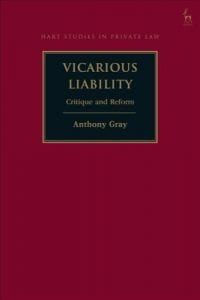By Prof Paula Giliker, Professor of Comparative Law (University of Bristol Law School)
 In this blog, I will discuss two recent publications which address comparatively the doctrine of vicarious liability in tort and demonstrate the value of a comparative perspective in this field. Vicarious liability is a rule of responsibility which is found across the common law of tort and typically renders an employer strictly liable for the torts of its employees provided that the tort takes place in the course of employment. The idea of holding an employer liable to pay compensation to victims of its employees’ torts, regardless of the absence of personal fault, is not, however, unique to the common law. Ideas of strict liability for the torts of others may also be found in civil law systems, although in some systems it is subject to a rebuttable presumption of fault (see, generally, Giliker, Vicarious Liability in Tort (CUP, 2010) and J Spier (ed), Unification of Tort Law: Liability for Damage Caused by Others (Kluwer Law International, 2003)). In all systems, it has proven controversial with some commentators arguing that the imposition of no-fault liability on employers conflicts with notions of corrective justice and notably, in a number of systems, it has been questioned to what extent liability can be said to be founded on economic justifications based on enterprise risk and loss distribution via social or private insurance. (more…)
In this blog, I will discuss two recent publications which address comparatively the doctrine of vicarious liability in tort and demonstrate the value of a comparative perspective in this field. Vicarious liability is a rule of responsibility which is found across the common law of tort and typically renders an employer strictly liable for the torts of its employees provided that the tort takes place in the course of employment. The idea of holding an employer liable to pay compensation to victims of its employees’ torts, regardless of the absence of personal fault, is not, however, unique to the common law. Ideas of strict liability for the torts of others may also be found in civil law systems, although in some systems it is subject to a rebuttable presumption of fault (see, generally, Giliker, Vicarious Liability in Tort (CUP, 2010) and J Spier (ed), Unification of Tort Law: Liability for Damage Caused by Others (Kluwer Law International, 2003)). In all systems, it has proven controversial with some commentators arguing that the imposition of no-fault liability on employers conflicts with notions of corrective justice and notably, in a number of systems, it has been questioned to what extent liability can be said to be founded on economic justifications based on enterprise risk and loss distribution via social or private insurance. (more…)

